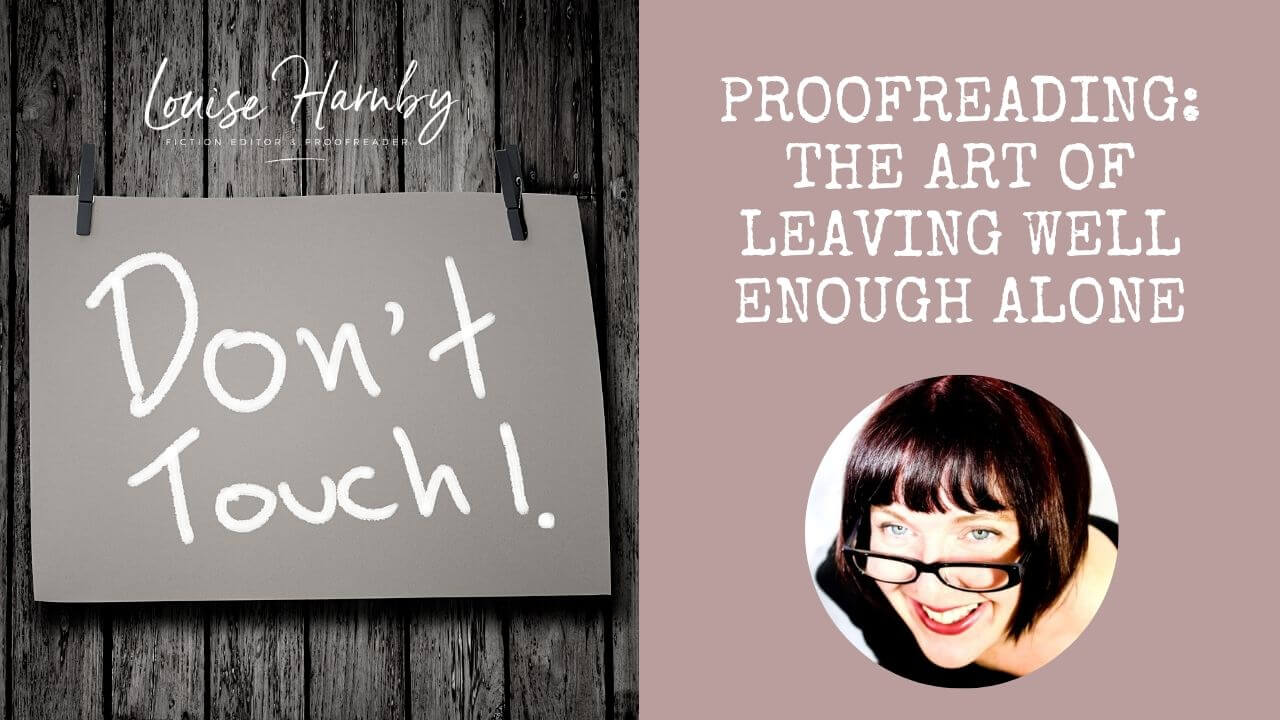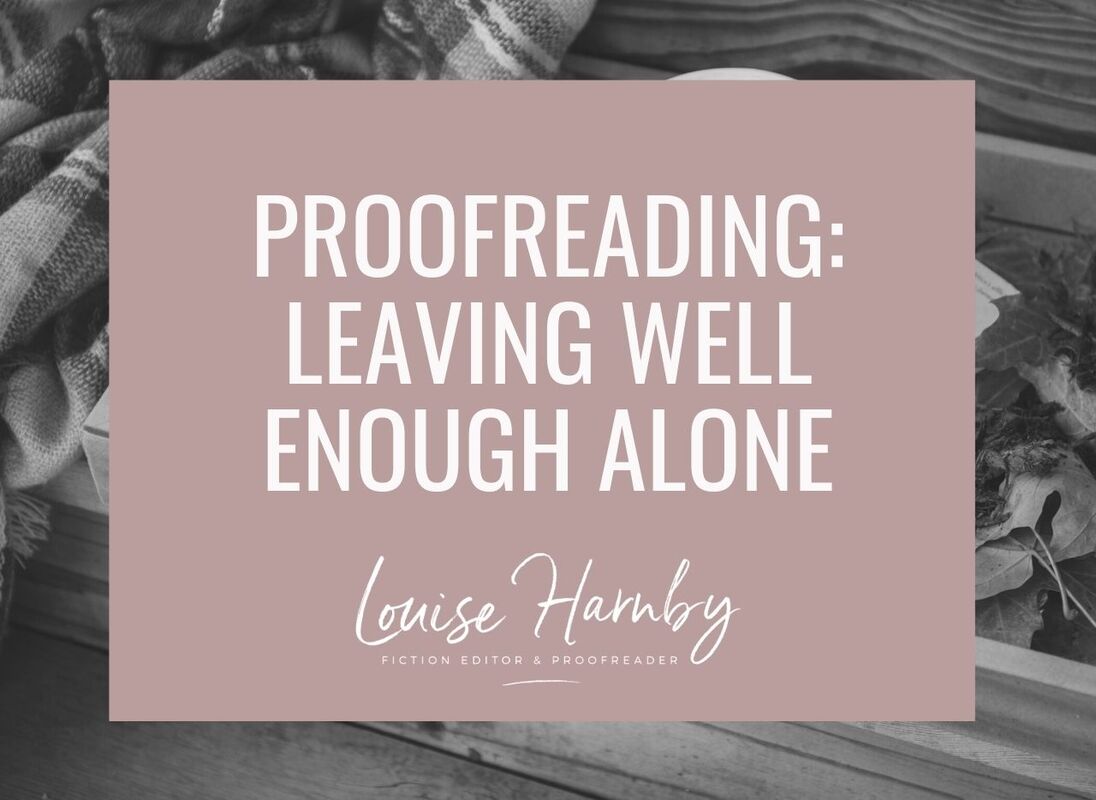|
If you're tasked with proofreading designed page proofs, annotating for change is not always the best course of action. We're into the realm of when to mark up, when to query and when to leave things be.
A Facebook discussion about the role of the proofreader working on copy-edited proofs got me thinking about the issue of leaving well enough alone.
This was something that was addressed by my proofreading training course (via The Publishing Training Centre), and it’s a tricky nut to crack, one that on occasion still stumps me, even though I have years of practice under my belt. To clarify, this article is framed within the context of the proofreader who is working with page proofs, because this is the case where the artistry of sensitive and sensible proofreading practice really comes into play. What are page proofs? The mainstream publisher will usually require the proofreader to work on page proofs: “Page proofs are so called because they are laid out as exactly as they will appear in the final printed book. If all has gone well, what the proofreader is looking at will be almost what the reader sees if they were to walk into a bookshop, pull this title off the shelf and browse through the pages. The layout process has been taken care of by a professional typesetter who designs the text in a way that is pleasing to the eye and in accordance with a publisher’s brief” (Not all proofreading is the same: Part I – Working with page proofs). In this case, the proofreader does not amend the text directly. She annotates the page proofs. Why is proofreading an art? Proofreading entails finding solutions to any final problems that have escaped the author’s, copy-editor’s, and typesetter’s attention. These professionals are only human, and it’s unusual not to find at least a few problems in a set of page proofs, despite the fact that the manuscript has been reviewed multiple times. In fact, precisely because there are so many rounds of review, the opportunity for errors to be introduced is higher. The artistry comes in because it’s not enough to be able to spot those final pesky typos, misplaced apostrophes, incorrect running heads, missing captions, poorly aligned table figures, and so on. The good proofreader needs to know when to leave well enough alone. The Chartered Institute of Editing and Proofreading (CIEP) says: “… Part of the job is light editing within tight limits, but professional proofreaders do not re-edit the material. They intervene only with good reason [my emphasis]” (CIEP, n.d. FAQs: Proofreading). Here’s a brief summary of why proofreaders need to take care with the extent of their mark-up:
A cautionary tale and a lesson learned Have I ever over-marked? Have I intervened when I should have left well enough alone? Alas, yes. And I wasn't an inexperienced proofreader when it happened. I’ve elected to share my tale of shame in the hope that any over-enthusiastic proofreaders reading this will be able to learn from the mistake I made! A few years ago I proofread an academic book for a regular publisher client. The book was copy-edited by an editor with whom I’d worked on several occasions. She always does a super job. And, really, that should have been the only alarm bell I needed. The page proofs arrived and I noticed that the book was littered with whiches – rather than thats – being used for restrictive relative clauses. I changed them all. In pen. After all, I reasoned, even though in British English this usage is acceptable (though not always preferred), my publisher client is a stickler and the book’s market is international. Satisfied that I’d done a very fine job indeed I posted back the proofs to the copy-editor, who went on to collate my changes with the author’s. A week later I received a very polite email from a frustrated copy-editor. She informed me that though she, too, would have preferred to change every appropriate “which” to “that,” the author was particularly sensitive to having his copy amended and she’d had to settle for a lighter edit. She’d notified the in-house project manager and the decision had been agreed. “In future, if any extensive changes need to be made, would you be kind enough to check first? I'm going to have to stet a lot of your mark-up.” On an embarrassment scale of one to ten, I rated at least fifteen. My face was redder than my proofreading pen. I’d wasted my time and I’d wasted hers. And if I’d simply checked with her (or the in-house project manager) before I’d let my pen run wild, the problem could have been avoided. I still work for that publisher and I still proofread books for that copy-editor. But I learned my lesson. A note: A colleague who reviewed this article argued persuasively that the embarrassment shouldn't have been mine alone – in this situation I wasn't given a comprehensive style sheet detailing the decisions made. Either the copy-editor or the publisher could have supplied one – certainly many professional editors consider this to be not only good business practice but proper business practice. At the very least, someone could have emailed me with a brief heads-up. Nevertheless, since the proofreader cannot guarantee that they’ll receive such a style sheet, and busy editors and publishers are only human and sometimes forget things, my point about querying stands. It’s always, always better to clarify than to assume. Amend, query or move on? Editing is an art. But proofreading is, too. Sometimes we need to stop and think before we amend; sometimes we need to put down the pen and either query or move on. Knowing when to leave well enough alone can be a tricky call to make. We’re not here to re-edit. What we do sits in the context of a chain of decisions that have already been made by other professionals – decisions about budget, schedule, style, brief and design. Failing to acknowledge this fact can lead to time wastage at best, and harm at worst.
Louise Harnby is a line editor, copyeditor and proofreader who specializes in working with crime, mystery, suspense and thriller writers.
She is an Advanced Professional Member of the Chartered Institute of Editing and Proofreading (CIEP), a member of ACES, a Partner Member of The Alliance of Independent Authors (ALLi), and co-hosts The Editing Podcast. Visit her business website at Louise Harnby | Fiction Editor & Proofreader, say hello on Twitter at @LouiseHarnby, connect via Facebook and LinkedIn, and check out her books and courses.
20 Comments
|
BLOG ALERTSIf you'd like me to email you when a new blog post is available, sign up for blog alerts!
TESTIMONIALSDare Rogers'Louise uses her expertise to hone a story until it's razor sharp, while still allowing the author’s voice to remain dominant.'Jeff Carson'I wholeheartedly recommend her services ... Just don’t hire her when I need her.'J B Turner'Sincere thanks for a beautiful and elegant piece of work. First class.'Ayshe Gemedzhy'What makes her stand out and shine is her ability to immerse herself in your story.'Salt Publishing'A million thanks – your mark-up is perfect, as always.'CATEGORIES
All
ARCHIVES
July 2024
|
|
|
|

















 RSS Feed
RSS Feed





